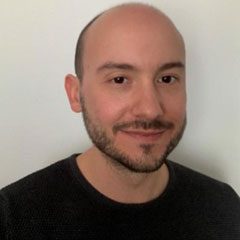Andrew Moriarty, NIHR Clinical Lecturer in Primary Care, HYMS

Andrew is an academic GP. He works clinically in practice two days a week and his main research interest is primary care mental health.
email: andrew.moriarty
Our 60-second interview with Andrew:
Could you please tell us what work you do in the field of mental health?
I use mixed methods to try to better understand how we can improve care for people with mental health problems in primary care. My most recent work has explored how best we can prevent relapse of depression after people have made an initial improvement. I have been using statistical prediction modelling to better understand risk factors for relapse; if we can ultimately estimate an individual’s risk of relapse, we could hopefully more effectively target relapse prevention at those who are likely to benefit most. I have also undertaken qualitative work with GPs and people with lived experience of depression to understand their perspectives and explore what happens in practice.
What do you find most rewarding and inspiring in this work?
PPI has driven my research to date. I find working with experts by experience inspiring – it ensures the research is more meaningful and relevant and reminds me that this is not abstract academic work but research that really (hopefully) has the potential to make things better for people day to day.
What is the most challenging or complicated aspect of this work?
GPs work with an undifferentiated group of patients – their presentations are often complex and multi-focal. This makes it challenging to produce findings that can be applied in practice to all patients. For example, it is important to ensure that definitions and procedures used in quantitative work are meaningful and make sense to the people impacted by the research. This is one of the reasons I have found a mixed methods approach to be so valuable. The other major challenge is that the NHS is increasingly time and resource limited – as a result, unfortunately prevention is not always prioritised.
What impact do you hope your work is having - or can potentially have?
I think that we could make a really strong case that a strategy of only being reactive to acute presentations is not actually an effective (or cost-effective) approach to providing healthcare. We need to be proactive and prioritise prevention where we can. My work to date has highlighted that this approach is favoured by people with lived experience of mental health problems and primary care health professionals. I hope we see a shift in this direction for people with mental health problems in primary care.
Could you share with us one piece of advice that you follow for your own mental health?
There are loads of things I really enjoy about being a clinical academic, but I try to be careful not to define myself by my work. I think it is important to make as much time as possible for family, friends and doing things I enjoy outside of work.